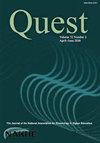志愿者偏见与女性参与运动与运动科学研究
IF 1.7
3区 教育学
Q2 EDUCATION & EDUCATIONAL RESEARCH
引用次数: 18
摘要
1973年,Harriet Williams在《探索》杂志上发表了关于运动机能学研究中的志愿者偏差(自我选择偏差)的文章。威廉姆斯以证据为基础的评论包括对志愿服务中的性别差异的讨论。最近,一些运动和运动科学家(ESS)认为,研究者的偏见解释了ESS研究中女性参与者比例低于男性的原因。在这里,我解释了在当代关于女性参与ESS研究的讨论中,志愿者偏见值得考虑。我讨论了参与某些研究的意愿的性别差异,以及这与人格特征和兴趣的性别差异是如何对应的。我解释说,疾病患病率和体育活动参与的性别差异也可能导致ESS研究参与的性别差异。我的结论是,向前发展,需要对女性参与ESS研究进行基于证据的历史解释,未来的研究应该寻求建立一个考虑研究者和志愿者偏见的ESS研究参与的因果模型。本文章由计算机程序翻译,如有差异,请以英文原文为准。
Volunteer Bias and Female Participation in Exercise and Sports Science Research
ABSTRACT In 1973, Harriet Williams published in Quest on volunteer bias (self-selection bias) in kinesiology research. Williams’ evidence-based commentary included a discussion on sex differences in volunteerism. More recently, some exercise and sports scientists (ESS) have suggested investigator bias explains the lower proportion of female than male participants in ESS research. Here, I explain volunteer bias warrants consideration in contemporary discussions on female participation in ESS research. I discuss sex differences in willingness to participate in certain research and how this corresponds to sex differences in personality traits and interests. I explain that sex differences in disease prevalence and physical activity participation also likely contribute to sex differences in ESS research participation. I conclude that, moving forward, evidence-based historical interpretations of female participation in ESS research are required, and future research should seek to establish a causal model of ESS research participation that considers both investigator and volunteer bias.
求助全文
通过发布文献求助,成功后即可免费获取论文全文。
去求助
来源期刊

Quest
社会科学-运动科学
CiteScore
4.50
自引率
14.30%
发文量
16
期刊介绍:
Quest is the official journal of the National Association for Kinesiology in Higher Education (NAKHE). It is the leading journal for interdisciplinary scholarship for professionals in kinesiology in higher education. Quest provides a public forum for scholarship, creative thought, and research relevant to a broad range of interests held by faculty and leaders in higher education today.
Quest publishes: 1) manuscripts that address issues and concerns relevant and meaningful to the field of kinesiology; 2) original research reports that address empirical questions that are contextualized within higher education and hold significance to a broad range of faculty and administrators in kinesiology; and 3) reviews of literature and/or research of interest to one or more sub-disciplines in kinesiology. Quest does not publish papers focused on sport (e.g., amateur, collegiate, professional) that are contextualized outside of kinesiology in higher education.
 求助内容:
求助内容: 应助结果提醒方式:
应助结果提醒方式:


